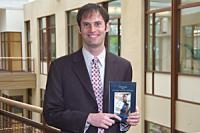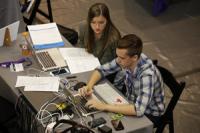-
Cybersecurity of the power grid: A growing challenge
Called the “largest interconnected machine,” the U.S. electricity grid is a complex digital and physical system crucial to life and commerce in this country. Today, it is made up of more than 7,000 power plants, 55,000 substations, 160,000 miles of high-voltage transmission lines, and millions of miles of low-voltage distribution lines. This web of generators, substations, and power lines is organized into three major interconnections, operated by 66 balancing authorities and 3,000 different utilities. That’s a lot of power, and many possible vulnerabilities. The grid has been vulnerable physically for decades. Today, we are just beginning to understand the seriousness of an emerging threat to the grid’s cybersecurity.
-
-
A computer’s blinking light could transmit data
A desktop computer’s tiny blinking LED light would hardly arouse the suspicions of anyone working in an office after hours. However, that LED could be silently winking out an optical stream of the computer’s secrets to a data-stealing drone.
-
-
Cybersecurity degree approved for Kennesaw State
The cybersecurity field in the U.S. will need an additional 1.5 million workers by the year 2020. The Board of Regents of the University System of Georgia on Tuesday approved an online Bachelor of Science in Cybersecurity at Kennesaw State University. The cybersecurity major includes elements of information technology, information security and assurance, and criminal justice, giving students a combination of technical knowledge and information security management skills.
-
-
Russia, Trump and the 2016 election: What’s the best way for Congress to investigate?

Exactly how will the U.S. conduct a fair and accurate investigation into Russian meddling in the 2016 election and links with President Donald Trump’s campaign? U.S. congressional leaders are discussing options. At a time when Congress is sharply polarized along partisan lines, congressional investigations tend to become microcosms of that polarization. This is all the more true when an investigation involves an issue about which the president is vulnerable to political embarrassment or attack. If the intelligence committee proves unable to conduct a thorough and bipartisan investigation of Russian meddling and Trump’s campaign, pressure will build on America’s leaders to establish a more independent probe. Hanging in the balance could be whether the United States can forge consensus about what happened and how to prevent it from happening again.
-
-
How science should respond to fake news
The rise of fake news has dominated the world of politics since the last U.S. election cycle. But fake news is not at all new in the world of science. “Fake news about science has always existed,” says one expert. “What has changed now is social media and the potential to disseminate this kind of news much faster among social networks.”
-
-
How Florida is helping train the next generation of cybersecurity professionals

Our increasingly connected and digital world is vulnerable to attack and needs more skilled professionals who know how to defend it. As connected devices proliferate, particularly smart devices creating what has been called the “Internet of Things,” the problem is getting worse. While we don’t know where and when the next cyber threats will arise, we can be sure that our society’s use of and demand for digital connections will only grow. As a result, we’ll also see the demand for cybersecurity professionals rise – and the opportunities for new ways of thinking, learning and collaborating.
-
-
Protecting bulk power Systems from hackers

Most of us take turning the lights on for granted. In reality, the energy we draw from the electrical grid to brighten homes, freeze food and watch TV is part of a complicated and widespread system. Understanding that system’s vulnerabilities and reliability is a crucial step towards improving its security. Reliability measures of electrical grid has risen to a new norm as it involves physical security and cybersecurity. Threats to either can trigger instability, leading to blackouts and economic losses.
-
-
Center for Long-Term Cybersecurity unveils 2017 research grantees
The Center for Long-Term Cybersecurity (CLTC) has announce the recipients of its 2017 research grants. In total, twenty-seven different groups of researchers will share a total of nearly $1 million in funding. CLTC says that the projects span a wide range of topics related to cybersecurity, including new methods for making crypto-currencies more secure; protecting health information stored on mobile devices; teaching high-school computer science students how to “program for privacy”; and exploring potential limits on the use of digital controls in nuclear reactors.
-
-
Information on hacking tool could be of use to “hostile entities”: FBI
The FBI on Monday said it was right for the agency to withhold documents which detail how it unlocked an iPhone used by one of the San Bernardino, California, shooters. The FBI said that the information, if released, could be exploited by “hostile entities.” The Justice Department, in response to a FOIA law suit by the AP, Vice Media, and Gannett, the parent company of USA Today, earlier this month released heavily redacted records relating to the incident – but withheld information about how much the FBI paid a third party to unlock the work phone of Syed Rizwan Farook.
-
-
Child from Pittsburgh admits to hack attempt of Brussels Airport after ISIS attacks
A Pittsburgh child has admitted to launching a cyberattack against Brussels Airport in the aftermath of the 22 Mach 2016 suicide bombing by Belgian ISIS followers, which killed more than thirty people. The Belgian federal public prosecutor’s office said the suspect aimed to take down the website of the airport operator – the Brussels Airport Company — and “infiltrate the computer system,” but was unsuccessful.
-
-
Cyberattacks increase stress hormone levels, perceptions of vulnerability
A new study shows that individuals exposed to a simulated cyberterror attack had significantly increased levels of the stress hormone cortisol in their saliva compared to a control group. Following the cyberattack, study participants were more likely to fear an imminent cyberthreat and to express feelings of personal insecurity.
-
-
New technique identifies smartphone thieves in seconds
Three million phones were stolen in the United States. Ben-Gurion University of the Negev (BGU) researchers have developed a technique that identifies a smartphone thief or intruder in under fourteen seconds.
-
-
ISIS followers hack U.K. National Health Service
ISIS-linked hackers have attacked and defaced several NHS (U.K. National Health Service) websites in a series of cyberattacks. The hackers, going by the name of Tunisian Fallaga Team, targeted six websites three weeks ago, replacing legitimate web pages with graphic photos of the war in Syria. The attacks said they were retaliating for the West’s interference in the Middle East.
-
-
How computer hacking is becoming Russia’s weapon of choice
The Russian government has long been known to source its technology, world-class hacking talent, and even some intelligence information from local cybercrime rings. What’s more, this criminal fraternity probably receives state immunity for cybercrimes committed outside Russia in return for offering services to the Russian state. Russia’s clear long-term strategy is to use the internet to further its aims in information warfare. It has proved that this form of warfare is more potent than kinetic warfare and that it can reap the benefits quickly and without fear of a coordinated response from the United States or NATO. Its use of criminal cyber rings ensures that it benefits from no (provable) direct links to the Russian government. A further downside is that China, North Korea, and Iran seem to be copying this model and have already been active in attacks against other nation states. The internet has changed mass communication in countless positive ways. But it is becoming an increasingly dangerous tool for subversive activity. A re-think and a re-boot are looking increasingly necessary.
-
-
Protecting quantum computing networks against hackers
As we saw during the 2016 U.S. election, protecting traditional computer systems, which use zeros and ones, from hackers is not a perfect science. Now consider the complex world of quantum computing, where bits of information can simultaneously hold multiple states beyond zero and one, and the potential threats become even trickier to tackle. Even so, researchers have uncovered clues that could help administrators protect quantum computing networks from external attacks.
-
More headlines
The long view
What Does Netflix’s Drama “Adolescence” Tell Us About Incels and the Manosphere?
While Netflix’s psychological crime drama ‘Adolescence’ is a work of fiction, its themes offer insight into the very real and troubling rise of the incel and manosphere culture online.
Confronting Core Problems in Cybersecurity
It’s common for governors and mayors to declare a state of emergency and activate the National Guard in the aftermath of hurricanes, tornadoes, and other natural disasters. But last month, officials in Minnesota took these steps in the wake of a major cyberattack on the city of St. Paul —a testament to how disruptive these attacks have become.
Voting from Your Sofa Is Secure Enough – but Will It Be Allowed?
A new electronic voting system developed at NTNU can withstand attacks from quantum computers, meaning digital elections can be conducted securely, even in the future.
